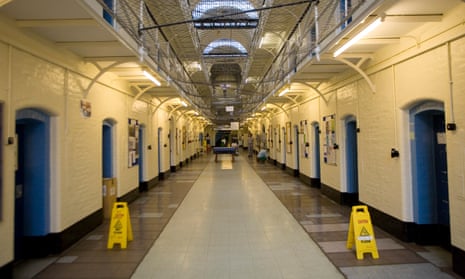The scale of failure in the prison system in England and Wales is “staggering”, with only 206 out of 10,000 promised new prison spaces delivered by the government, parliament’s spending watchdog has said.
Ministers and officials have failed to deliver on a pledge to improve the condition of the prison estate by 2020, the public accounts committee says in its report, published on Friday.
In 2016 the Prison Service launched the “prison estate transformation programme”, which was expected to create 10,000 new-for-old prison places by 2020 by building five new prisons and two new residential blocks. But by January 2020 it had created 206 prison places, the report says.
The committee says the Prison Service allowed a “staggering” backlog of maintenance work to build up that will cost more than £900m to address, meaning 500 prison places are taken permanently out of action each year due to their poor condition.
The poor state of many prisons, coupled with high levels of overcrowding, are contributing to dangerously high levels of violence and self-harm in prisons, the report says. Meanwhile, there is “no sign of a cross-government strategy for reducing reoffending”, it says.
The committee says the failures at the Ministry of Justice echo the disastrous and now abandoned reforms to probation services introduced by Chris Grayling when he was justice secretary.
“The scale of failure in our prisons and in the disastrous probation reforms is really quite staggering,” said Meg Hillier, the committee’s chair. “The ministry is still reeling from the long-term consequences of its unrealistic 2015 spending review settlement, but our whole society is bearing the financial and human cost of sustained underinvestment. Even now we are not convinced MoJ and HMPPS [the Prison and Probation Service] have the ingredients for an effective, sustainable long-term strategy.
“We now expect a set of reports to be made to us over the coming months assessing the realistic costs of their mistakes to date and how to fix them, and a credible new plan for a working prison estate and system that can reduce reoffending – not just lock people in to this cycle of violence and harm.”
The transformation programme ran for almost three years before it was superseded by a government announcement in August 2019 committing to create a further 10,000 prison places, in addition to the 3,566 now expected to be built under the original programme. The Prison Service now aims to deliver a total of 13,566 new prison places, including 6,500 places by 2025–26 through four new prisons.
In 2015 the Prison Service contracted the private outsourcers Amey and Carillion to provide facilities management across the prison estate in an attempt to save £79m. Following Carillion’s collapse in January 2018, the MoJ established Gov Facility Services Limited (GFSL), a not-for-profit government company, to assume responsibility for its work.
The shadow justice secretary, David Lammy, said: “The Ministry of Justice’s failure to create prison and probation services fit for the 21st century is putting public safety at risk. Its failed approach to outsourcing has contributed to a system that removes the hope of rehabilitation, guarantees an endless cycle of reoffending and creates new victims of crime.
“That the government has not even come close to delivering on its own promises shows a complete lack of competence and a failure of leadership.”
Frances Crook, the chief executive of the Howard League for Penal Reform, said: “Cramming more and more people into crumbling jails has succeeded only in exposing more and more people to crime, violence and despair. Each and every half-baked measure enacted for reasons of political expediency has demonstrated a lack of care for the people living and working in prisons and a lack of care for future victims of crime, who would be protected if the system worked as it should.”
Peter Dawson, the director of the Prison Reform Trust, said the report showed that the government had “no coherent plan” to reduce reoffending among prison leavers. “That represents a betrayal of the communities to which prisoners return,” he said. “And it is a shameful way to treat the people who live and work in our prisons.”
A Ministry of Justice spokesperson said: “We are investing £2.75bn to modernise the prison estate and deliver 10,000 new prison places – strengthening security and boosting rehabilitation. Work is already underway on two modern prisons at Glen Parva [in Leicestershire] and Wellingborough [in Northamptonshire] which will create 3,360 new places over the next three years.”
